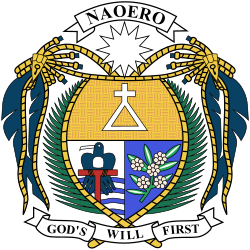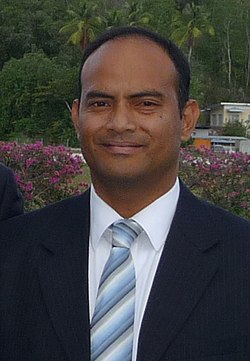| Portrait | Name
(Birth–Death) | Election | Term of office | Political party |
|---|
| Took office | Left office | Time in office |
|---|
|  | Hammer DeRoburt
(1922–1992) | 1968
1973 | 17 May 1968 | 22 December 1976 | 8 years, 219 days | Independent |
|---|
|  | Bernard Dowiyogo
(1946–2003) | 1976
1977 | 22 December 1976 | 19 December 1978 | 1 year, 362 days | NP |
|---|
|  | Lagumot Harris
(1938–1999) | — | 19 December 1978 | 23 December 1978 | 4 days | Independent |
|---|
|  | Hammer DeRoburt
(1922–1992) | 1980
1983 | 23 December 1978 | 17 September 1986 | 7 years, 268 days | Independent |
|---|
|  | Kennan Adeang
(1942–2011) | — | 17 September 1986 | 1 October 1986 | 14 days | NP |
|---|
|  | Hammer DeRoburt
(1922–1992) | — | 1 October 1986 | 12 December 1986 | 72 days | Independent |
|---|
|  | Kennan Adeang
(1942–2011) | — | 12 December 1986 | 22 December 1986 | 10 days | NP |
|---|
|  | Hammer DeRoburt
(1922–1992) | 1986
1987 | 22 December 1986 | 17 August 1989 | 2 years, 238 days | Independent |
|---|
|  | Kenas Aroi
(1942–1991) | — | 17 August 1989 | 12 December 1989 | 117 days | Independent |
|---|
|  | Bernard Dowiyogo
(1946–2003) | 1989
1992 | 12 December 1989 | 22 November 1995 | 5 years, 345 days | DPN |
|---|
|  | Lagumot Harris
(1938–1999) | 1995 | 22 November 1995 | 11 November 1996 | 355 days | Independent |
|---|
|  | Bernard Dowiyogo
(1946–2003) | — | 11 November 1996 | 26 November 1996 | 15 days | DPN |
|---|
|  | Kennan Adeang
(1942–2011) | — | 26 November 1996 | 19 December 1996 | 23 days | DPN |
|---|
|  | Ruben Kun
(1942–2014) | — | 19 December 1996 | 13 February 1997 | 56 days | Independent |
|---|
|  | Kinza Clodumar
(1945–2021) | 1997 | 13 February 1997 | 18 June 1998 | 1 year, 125 days | CP |
|---|
|  | Bernard Dowiyogo
(1946–2003) | — | 18 June 1998 | 27 April 1999 | 313 days | DPN |
|---|
|  | René Harris
(1947–2008) | — | 27 April 1999 | 20 April 2000 | 359 days | Independent |
|---|
|  | Bernard Dowiyogo
(1946–2003) | 2000 | 20 April 2000 | 30 March 2001 | 344 days | DPN |
|---|
|  | René Harris
(1947–2008) | — | 30 March 2001 | 9 January 2003 | 1 year, 285 days | Independent |
|---|
|  | Bernard Dowiyogo
(1946–2003) | — | 9 January 2003 | 17 January 2003 | 8 days | DPN |
|---|
|  | René Harris
(1947–2008) | — | 17 January 2003 | 18 January 2003 | 1 day | Independent |
|---|
|  | Bernard Dowiyogo
(1946–2003) | — | 18 January 2003 | 9 March 2003 | 50 days | DPN |
|---|
|  | Derog Gioura
(1932–2008) | — | 10 March 2003 | 29 May 2003 | 80 days | Independent |
|---|
| 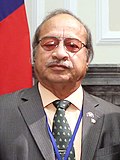 | Ludwig Scotty
(born 1948) | 2003 | 29 May 2003 | 8 August 2003 | 71 days | Independent |
|---|
|  | René Harris
(1947–2008) | — | 8 August 2003 | 22 June 2004 [6] | 319 days | Independent |
|---|
|  | Ludwig Scotty
(born 1948) | 2004 | 22 June 2004 | 19 December 2007 | 3 years, 180 days | Independent |
|---|
| 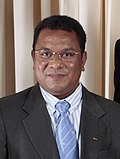 | Marcus Stephen
(born 1969) | 2007
2008
2010 (April)
2010 (June) | 19 December 2007 | 10 November 2011 | 3 years, 326 days | Independent |
|---|
|  | Freddie Pitcher
(born 1967) | — | 10 November 2011 | 15 November 2011 | 5 days | Independent |
|---|
|  | Sprent Dabwido
(1972–2019) | — | 15 November 2011 | 11 June 2013 | 1 year, 208 days | Independent |
|---|
|  | Baron Waqa
(born 1959) | 2013
2016 | 11 June 2013 [7] | 27 August 2019 | 6 years, 77 days | Independent |
|---|
| 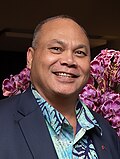 | Lionel Aingimea
(born 1965) | 2019 | 27 August 2019 | 29 September 2022 | 3 years, 33 days | Independent |
|---|
|  | Russ Kun
(born 1975) | 2022 | 29 September 2022 | 30 October 2023 | 1 year, 31 days | Independent |
|---|
|  | David Adeang
(born 1969) | 2023
2025 | 30 October 2023 | Incumbent | 2 years, 12 days | Independent |
|---|
